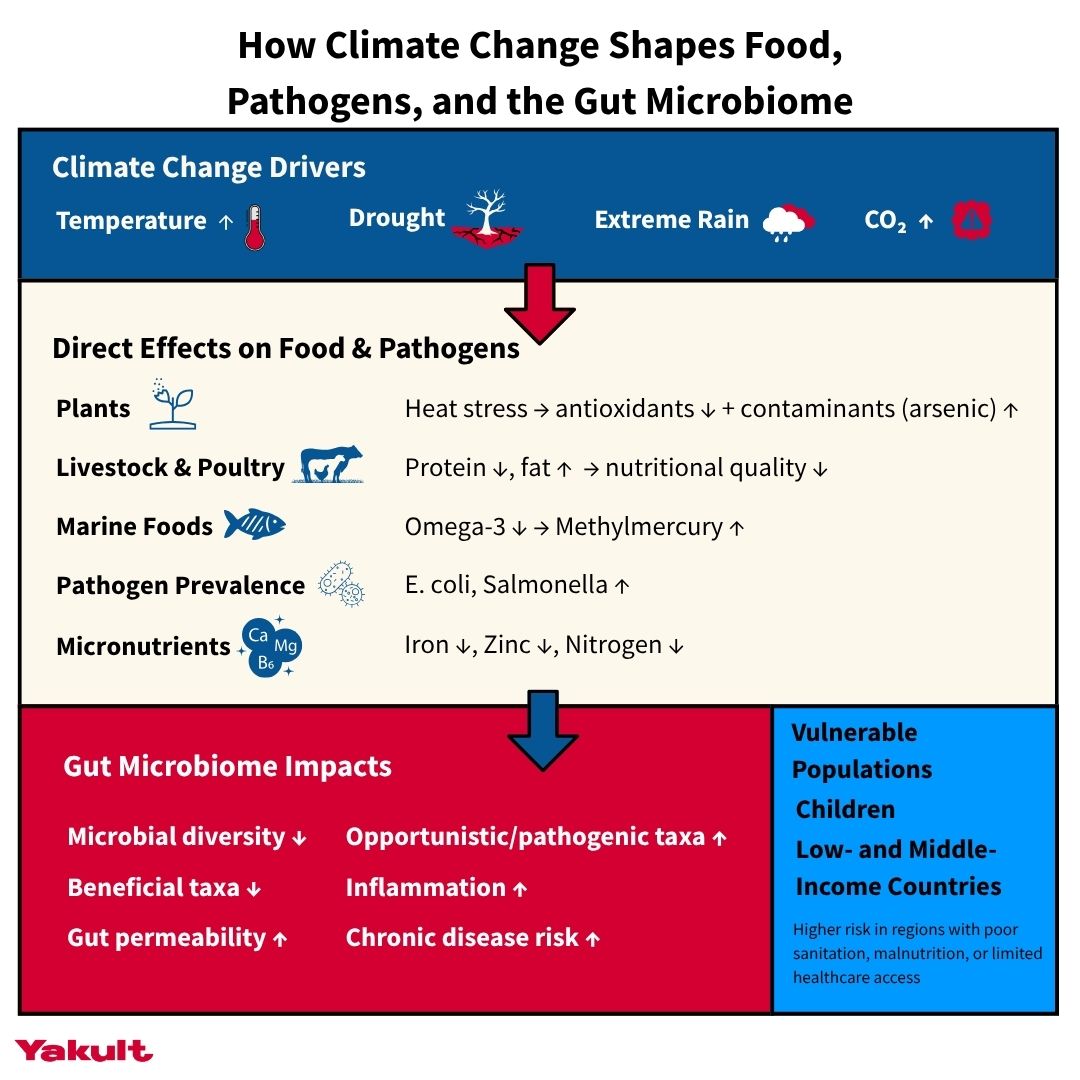When we think of climate change, we often picture melting ice caps or extreme weather. But did you know it can also affect your gut health?
Many health issues are linked to changes in our environment, and climate change is now a major part of that story.(1) As carbon dioxide and greenhouse gases rise, our planet is warming faster than ever. This affects ecosystems, reduces biodiversity, and puts pressure on the natural systems that support food production and human health.(2)
How Climate Change Affects Gut Health
Beyond environmental impacts, climate change affects human health, including the gut microbiome. Changes in soil quality, food production, nutrient availability, and air quality can all impact these microbes.3 For example, extreme weather may affect what foods are available or how nutritious they are. These shifts can, in turn, change the balance and diversity of our gut bacteria, which may affect our overall health and wellbeing.(3)
Food Availability and Nutrition
Rising temperatures and unpredictable weather can reduce crop yields and increase food shortages.(4,5) When people don’t get enough nutritious food, it can weaken the gut barrier and allow harmful bacteria to grow.(6,7) This is especially worrying in communities already facing food insecurity.
By 2050, climate change could leave over 100 million people protein-deficient and nearly 200 million zinc-deficient.(8) These deficiencies can have negative health effects: protein deficiency can lead to muscle loss, weakened immunity, and slower growth in children, while zinc deficiency can impair immune function, slow wound healing, and increase susceptibility to infections.
Higher carbon dioxide levels and rising temperatures can reduce the nutritional value of crops by lowering their protein and mineral content and making food less digestible.(8) Staple foods such as wheat, rice, and maize may contain less iron, zinc, and protein under these conditions.(9) Changes in soil health, including nutrient loss and reduced microbial diversity, also mean that the crops we grow may contain fewer nutrients than before, which could affect both food security and human gut health.(10) As a result, “hidden hunger,” or nutrient deficiency despite adequate calorie intake, could rise by around 10%.(11)
The figure below summarises how climate change affects food and pathogens, with flow-on effects for the gut microbiome and human health.

Figure 1. Climate change drivers influence food and pathogens, leading to downstream impacts on the gut microbiome and vulnerable populations.
The foods we eat do not just fuel our bodies, they also feed the trillions of microbes living in our gut. As our planet changes, so do our food choices, which can impact gut health in ways we are only beginning to understand. Climate change can affect the availability, quality, and nutritional content of the foods we rely on, which in turn influences the diversity and balance of our gut microbiome. While climate-related changes to food and nutrition might sound concerning, there are practical ways to support your microbiome and keep your gut healthy, such as enjoying a balanced and nutrient-rich diet.
Why It Matters
Climate change is reshaping the foods we eat and, in turn, the microbes that support our health. While these challenges are complex, they also open the door to solutions that strengthen resilience. By encouraging dietary diversity, safeguarding sustainable food systems, and supporting beneficial microbes through approaches such as probiotic interventions, we can help protect gut health in a changing world.(3)
Yakult’s Commitment to Sustainability and Gut Health
At Yakult, we’re doing our part by aligning with the Yakult Group Environmental Vision 2050—to realise a society where people and the planet co-exist as one through a value chain with zero environmental impact—with the goal of achieving net zero carbon by 2050. The Yakult Group Environmental Targets 2030 outline key priorities, which are climate change mitigation and adaptation, transitioning to sustainable packaging, responsible water source management, and biodiversity conservation. With these targets and our dedication to promoting gut health through microbiome science, Yakult demonstrates that protecting human health and the planet can truly go hand-in-hand.
Together, these strategies remind us that nutrition and microbiome science are not just about surviving climate pressures, they’re about enabling individuals and communities to thrive.
References:
- WHO We Must Fight One of the World’s Biggest Health Threats: Climate Change. Published 2023 Nov 3. Accessed on 6 Oct 2025)]. Available online: https://www.who.int/news-room/commentaries/detail/we-must-fight-one-of-the-world-s-biggest-health-threats-climate-change
- Malhi Y, Franklin J, Seddon N, et al. Climate change and ecosystems: threats, opportunities and solutions. Philos Trans R Soc B Biol Sci. 2020; 375, 20190104 doi: 10.1098/rstb.2019.0104
- Litchman E. Climate change effects on the human gut microbiome: complex mechanisms and global inequities. The Lancet Planetary Health. 9(2); e134 – e144 https://www.thelancet.com/journals/lanplh/article/PIIS2542-5196(24)00332-2/fulltext
- von Schwartzenberg RJ, Bisanz JE, Lyalina S, et al. Caloric restriction disrupts the microbiota and colonization resistance. Nature. 2021; 595:272-277 https://www.nature.com/articles/s41586-021-03663-4
- Gou W, Wang H, Tang XY, et al. Early-life exposure to the Great Chinese Famine and gut microbiome disruption across adulthood for type 2 diabetes: three population-based cohort studies. BMC Med. 2023; 21:414. doi: https://doi.org/10.1186/s12916-023-03123-y
- Kelly P. Starvation and its effects on the gut. Adv Nutr. 2021; 12:897-903. doi: 10.1093/advances/nmaa135
- Patterson GT, Osorio EY, Peniche A, et al. Pathologic inflammation in malnutrition is driven by proinflammatory intestinal microbiota, large intestine barrier dysfunction, and translocation of bacterial lipopolysaccharide. Front Immunol. 2022; 13, 846155. doi: 10.3389/fimmu.2022.846155
- Smith MR, Myers SS. Impact of anthropogenic CO2 emissions on global human nutrition. Nat Clim Chang. 2018; 8:834-839. doi: https://doi.org/10.1038/s41558-018-0253-3
- Soares JC, Santos CS, Carvalho SMP, et al. Preserving the nutritional quality of crop plants under a changing climate: importance and strategies. Plant Soil. 2019; 443:1-26. doi: https://doi.org/10.1007/s11104-019-04229-0
- Fierer, N. Embracing the unknown: disentangling the complexities of the soil microbiome. Nat Rev Microbiol 15, 579–590 (2017). Doi: https://doi.org/10.1038/nrmicro.2017.87
- Disability-adjusted life years due to chronic and hidden hunger under food system evolution with climate change and adaptation to 2050. Am J Clin Nutr. 2021; 114:550-563. doi: 10.1093/ajcn/nqab101.
